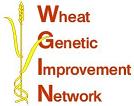Crop Genetic Improvement Networks
The Joint GINs and the new Research Advisory Group (RAG)
Defra has been funding several Crop Genetic Improvement Networks (GINs) since 2003. Currently, Defra has awarded 5.5 million GBP to four GINs over a five year period from 2018 to 2023 to help improve the productivity and resilience of the arable sector (including field vegetables).
The four GINs currently being funded are:

|
 |
 |
 |
Each GIN includes internationally renowned scientists in crop genetic improvement (on wheat, field and leafy vegetables, pulse crops and oilseed rape), undertaking work to identify and characterise pre-breeding resources with improved productivity and resilience to major biotic and abiotic stresses. Key representatives of the UK breeding industry and AHDB have a strong presence within the GINs, participating in regular management meetings, making in-kind contributions towards germplasm production and analysis, influencing the strategic direction of the research and taking forward practical application. An annual stakeholder forum is held for each GIN, which showcases the research, discusses new approaches, aids in encouraging knowledge exchange and exploitation and general out-reach to a wider base of potential stakeholders.
Although the four projects are distinct activities under separate contracts, Defra has procured the projects under a common research platform structure to encourage cross fertilisation of ideas and encourage a joined-up approach to genetic improvement. This increased interaction will assist in improving the productivity and resilience of the cropping sector as a whole. Under the new platform structure a Research Advisory Group has ben established to provide a non-executive technical steer and appropriate challenge across the programme, to ensure the quality of the work carried out under the GINs and to maximise their impact.
The GIN Research Advisory Group meets bi-annually (June and December) to provide scientific comment and challenge where appropriate on the work programme for the year ahead, as well as providing quality assurance of outputs from the previous year.
A previously funded GIN was BEGIN

The aims of these GINs are to support sustainable development of the arable sector,
by investing in public sector research and enabling better collaboration between the strong
UK research base and the plant breeding industry.
This is achieved by:
Disseminating Resources: Making available existing and generating new genomic tools and knowledge, in order to promote uptake of genomic technology
Improved Communication: Creating stakeholders' fora though which all interested parties can provide input and obtain information on the activities of the Networks.
The longer-term vision is that these Networks will help build critical mass in relevant applied strategic research in the UK so that the relevant teams become key to international 'public good' crop breeding research and can be sustained in the long term by a diverse funding base.
Organisation of projects
The structure of the largest Networks supports three types of projects:
1. A large core project that will generate, and make available in the public domain, technologies, genetic resources and
expertise. This project has to have a management team comprising the research providers and funders with the
responsibility for the science in the core project and management of the Network; and a stakeholders' forum, to
promote debate, knowledge dissemination and feedback to the management team.
2. Specific, time-bound projects on traits, subjects and technologies identified as priorities, funded by Defra and other
public research sponsors. These will generate more specific information and resources that will feed into the core
project.
3. LINK projects led by the industry that bring the research forward to exploitation.
.jpg)
